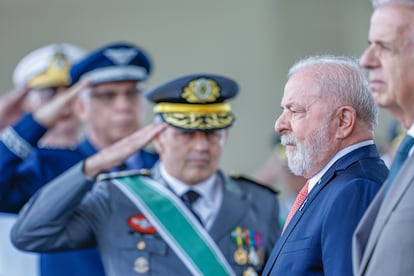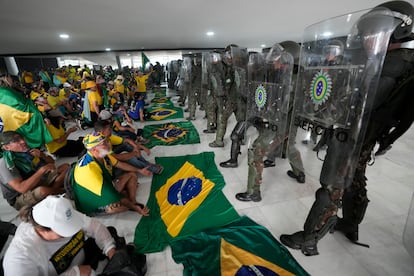A year after the attempted coup in Brazil, Lula’s relationship with the military remains tense
On Monday, the president is leading an event with Congress and the Supreme Court to celebrate the country’s democracy on the first anniversary of Bolsonaro supporters’ assault in Brasília


That fateful Sunday, when pandemonium broke out in Brasília, reserve colonel Adriano Testoni, 56, was there, standing in the plaza that is home to the beating heart of Brazil’s democracy. Dressed in a Brazil soccer jersey, he recorded himself on his cell phone. “Armed Forces, sons of bitches! Bunch of generals, sons of bitches! Cowards! Look at what they are doing to us! Our army is shit!” he shouts at the screen while literally foaming at the mouth. The date was January 8, 2023. The anniversary of the Jan. 6 assault on the U.S. Capitol in Washington had just passed. In both the United States and Brazil, conspiracy theories about alleged election fraud were stirring up feelings.
On that Sunday, supporters of Brazil’s former president Jair Bolsonaro stormed the Supreme Court, the National Congress building and the Planalto Presidential Palace in the Three Powers Plaza. Among the mob were the colonel and his wife, a pharmacist, also in a soccer jersey. When police tried to contain the situation with tear gas, the two fled. The Bolosnaro supporters had dreamed of unleashing chaos, getting the Armed Forces to intervene and snatching power from Luiz Inácio Lula da Silva, who has been president for just one week. That video, shared out due to feelings of grievance, impunity, vanity or perhaps pure stupidity, was key to convicting Testoni.

That Sunday, “Lula’s distrust of the military increased exponentially,” says Fabio Victor, author of the book Camouflaged Power. The journalist gives two examples of this. Firstly, the president could have launched a Decree to Guarantee Law and Order (GLO), which would have mobilized the military to bring order to the situation. But he did not: instead, he opted for a security intervention under civilian control. Three hours and more than a thousand arrests later, order was restored.
Then came the second decision: the dismissal of dozens of military personnel. Lula put his security in the hands of the Federal Police. “Later he backed down, but the first lady’s security is still in the hands of the police. She trusts the military even less than her husband,” Victor notes. Two weeks later, Lula fired the army chief due to lack of confidence.
This Monday, Lula will lead an event in Brasília, in the Senate, to celebrate democracy on the first anniversary of the attack. The heads of the Armed Forces, Congress, the Supreme Court and some of the governors are expected, while Bolsonaro’s allies have made all kinds of excuses not to attend.
The number of military officers that have been punished for the coup assault can be counted on the fingers of one hand. It is unknown how many of the more than 1,000 people arrested on January 8 and 9 were military officials or police officers. The first 30 people convicted — all civilians — received exemplary sentences, up to 17 years in prison. The goal being to ensure that no one thinks of repeating their efforts.
But the punishment of military officials has been limited and light. Colonel Testoni, for example, was sentenced in a military court to one month and 18 days in open prison regime. He was charged for making offensive remarks. The military court punished two more for indiscipline. “There is still no public record of punishments for officers who were part of the insurrection plot, only a couple who offended the high command or shared coup rhetoric on social networks,” explains Eduardo Heleno, a professor at the Institute of Strategic Studies of the Federal Fluminense University (UFF).

Brazil’s Armed Forces — the army and troops, more so than the commanders — are an important source of votes for Bolsonaro, who was in the United States on the day of the assault. The right-wing former president, a retired military officer, remains under investigation for instigating anti-democratic acts. Two of his direct subordinates were the most high-profile figures to be imprisoned in the case: Lieutenant Colonel Mauro Cid, an aide who held Bolsonaro’s cell phone, and then-Justice Minister Anderson Torres, a military police officer who, when he turned himself in to the police, conveniently forgot his cell phone. Both are under house arrest.
A year after the coup attempt, Lula’s relationship with the military is “very delicate,” says Victor. “I would say that it is marked by ongoing tension, which is controlled by Lula’s historical conciliatory nature.” The three-time president does not like direct confrontation, preferring instead to negotiate deals that, no matter what, leave both parties satisfied (or dissatisfied). As a union leader in the factories of São Paulo, he fought the military dictatorship by organizing strikes.
Experts say that Lula’s decision to pick José Múcio as Defense Minister is a reflection of his conciliatory character. The 75-year-old is a right-wing politician and friend of Lula, who — according to Victor — “is responsible for satisfying the interests of the military and avoiding punishing the members of the Armed Forces, as demanded by the left.”
Last Friday, in an interview with the O Globo newspaper, Múcio claimed that “there was a desire for a coup, but the Armed Forces did not want it.” According to Múcio, it failed because there was no leader, and with no leader, there was no revolution. “They were ladies, children, boys, girls… as if it were a great picnic. […] It was a movement of vandals financed by irresponsible businessmen.” For President Lula, the coup was the result of a pact between Bolsonaro, the governor of the Federal District, the army and capital police.
In Brazilian politics, everything tends to simmer over time. Staging is crucial, and perfecting the timing is essential to staying in the limelight. This is clearly seen with General Eduardo Villas Boas, the head of the Brazilian army. In 2018, while the Supreme Court was debating whether to imprison Lula (and remove him from the presidential race), the general tweeted against impunity, appealed to the Constitution and warned that the army “remains attentive to its institutional missions.” Bolsonariso supporters cling to the controversial Article 142 of the Constitution, which grants the military an alleged moderating power, although this is disputed by the Supreme Court.
The Armed Forces have played a significant role in Brazilian history, be it in establishing the republic in 1889 or overthrowing legitimate presidents such as Getúlio Vargas (in his democratic, not dictatorial term) and João Goulart.
In line with Brazil’s love for congressional inquiries, the 2023 coup attempt had its own. And as though the world had gone topsy-turvy, it was driven by Bolsonaro allies, while Lula’s Workers’ Party was initially reluctant to launch the proceeding. The commission concluded with the recommendation that Bolsonaro and 60 other people should be prosecuted, half of them military officials, including eight generals. That was last October. The ball is in now in the court of the Prosecutor’s Office, which is yet to make a move.
Professor Heleno explains that the assault on Brasília was the culmination of a process that had been building up for months. Since Lula’s win at the end of October, Bolsonaro supporters had been setting up camps outside barracks to call on the military to intervene to prevent him from returning to power. On the night of the coup, a general stopped the rioters camp in front of the army headquarters in Brasília from being dismantled, as the police requested. Officers had to return at dawn, and by then many of the people who took part in the coup attempt, including soldiers and their families, had gone home.
The pragmatic Lula has been using his previous strategy to court favor with the military: winning them over with budget incentives and protecting their privileges. The mega public investment program which Lula hopes will reactivate the economy includes $11 billion for nuclear submarines, frigates, new armored vehicles, and more. Meanwhile, thousands of single daughters of military personnel will continue to enjoy the juicy pension that their parents left them as an inheritance.
Surveys show that the Armed Forces have lost credibility and social support in the last year. Not only because they became seen as partisan due to their close relationship with Bolsonaro — the former president had more generals than women in his government — but also because of their mistakes during the Covid-19 pandemic and scandals such as the revelation that Bolsonaro received expensive jewelry from Saudi Arabia. And to top it off, there was the assault on Brasília. With Bolsonaro defeated and banned from public office, the alliance with the Armed Forces has been broken, but the far-right former president is still the politician who is most in tune with the military.
This year, the anniversary of the 1964 coup d’état was not officially celebrated in the barracks, as happened during Bolsonaro’s administration. But Heleno and Victor agree that civilian control over the Brazilian military is still limited. “Those in uniform have temporarily returned to the shadows, forced by circumstances. But the task of depoliticizing the barracks is complex and could take a long time, if it is ever completed,” says the professor.
To make a delicate situation even more difficult, the unthinkable has materialized at Brazil’s doorstep: the threat of war. Brazil borders Venezuela and Guyana, where the rich and tiny territory of Essequibo is located. It has now become the heart of the dispute between Venezuela and Guyana. And Brazil’s military is once again on alert due to the threat.
Sign up for our weekly newsletter to get more English-language news coverage from EL PAÍS USA Edition
Tu suscripción se está usando en otro dispositivo
¿Quieres añadir otro usuario a tu suscripción?
Si continúas leyendo en este dispositivo, no se podrá leer en el otro.
FlechaTu suscripción se está usando en otro dispositivo y solo puedes acceder a EL PAÍS desde un dispositivo a la vez.
Si quieres compartir tu cuenta, cambia tu suscripción a la modalidad Premium, así podrás añadir otro usuario. Cada uno accederá con su propia cuenta de email, lo que os permitirá personalizar vuestra experiencia en EL PAÍS.
¿Tienes una suscripción de empresa? Accede aquí para contratar más cuentas.
En el caso de no saber quién está usando tu cuenta, te recomendamos cambiar tu contraseña aquí.
Si decides continuar compartiendo tu cuenta, este mensaje se mostrará en tu dispositivo y en el de la otra persona que está usando tu cuenta de forma indefinida, afectando a tu experiencia de lectura. Puedes consultar aquí los términos y condiciones de la suscripción digital.








































